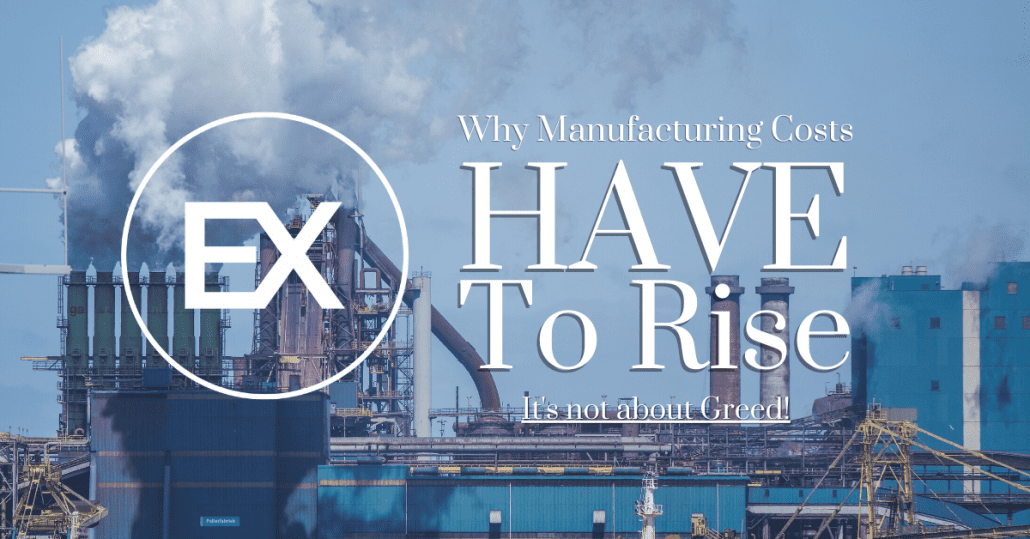Why Manufacturing Costs HAVE to rise
- Curtis Bligh
- 16 minute read
Share this article:

Table of Contents
It’s nothing to do with Greed!
A subject hated by most, but nonetheless has to be addressed is rising Manufacturing costs. The impact of events over the past two years has seen large increases in prices not just amongst manufacturers in the UK but also worldwide. There are a number of factors that have contributed to these rising costs, including but not limited to steel mill output slashed as a result of lockdowns, rising shipping costs as containers were commandeered for vaccine distribution, and rising living costs as energy and fuel prices soar.
The sore subject of price increases is on everyone’s tongue and one that we all have to face up to at some point. In today’s article we address some of the factors that have contributed to rising costs in manufacturing and use these points to highlight why prices have had to rise.
Falling Steel Mill Output and Sharp Rising Demand
During the first wave of lockdowns worldwide, many businesses were forced into temporarily shutting down their operations to help combat the spread of Covid-19. Europe was hardest hit as large swathes of industry using steel closed down (Onstad, 2020). Germany during 2020 was the largest exporter of steel products to the UK according to Statista (2021). In 2020, it was amongst the hardest hit as steel production dipped -10% year-on-year (Eurometal, 2022).
Tata Steel, among many, also had to adjust its flat steel output in the UK and Netherlands to align with reduced demand. The halt to car manufacturing in particular had a widespread impact on steelmakers who either stopped or cut production of steel (MB, 2022). The impact of the pandemic had a profound impact on steel output which decreased by 0.9% globally which included EU steel production falling 11.8% whilst in the US, it dropped by 17.2% (WSA, 2021).
There was however a ‘V-Shaped’ recovery as restoration activities took place and manufacturing production resumed after the first initial lockdown. This resulted in a surge in demand for steel as steel mill order books filled up with buyers looking to lock in steel supply on the back of a year of output curbs and idling plants (Bloomberg News, 2021).
Steel supply was also further hampered by operational issues worldwide for Iron ore supply which further tightened the market (Bloomberg News, 2021). Demand for steel surged to a point that steel mills were selling for the third and fourth quarter of the financial year. Bloomberg reported that demand outside China was at its highest for many years, with worldwide steel demand growing 5.8% and exceeding pre-pandemic levels (Bloomberg News, 2021).
During 2021 alone, Steel prices hiked a total of seven times from British Steel (Morby, 2021). In recent weeks British Steel announced a further price increase of £50 a tonne lifting the price of Steel to around £340 a tonne on the back of 18 months of price hikes (Morby, 2022). In a letter to contractors, British Steel blamed the sustained high steel making costs for the recent price hike. Forecasts are also anticipating further increases by as much as 7-10%, and it is largely thought that imports from the EU and further afield will be needed to meet current demand (Morby, 2022).
Soaring Freight Costs
A leap in shipping costs is also impacting manufacturing costs, with many buyers already facing limited spot supplies of raw materials including steel. A spokesperson from Make UK told Express.co.uk that manufacturers were seeing inflationary spikes of around 10% and some have opted for air freight (Hill, 2021).
The soaring costs in shipping was largely linked with rapid demand for goods after the pandemic triggered a slump in production. Disruptions from lockdowns and a shortage of workers is also associated with rising costs (White, 2021). Sought-after routes like Shanghai to Rotterdam have seen eye-watering prices rise by as much as 570% in the last 12 months (White, 2021).
Shipping rates have also been impacted by China’s ‘Zero-Covid’ Policy which has often seen port closures. And with the nation home to eight out of the world’s ten busiest ports, and the source of 80% of the worlds goods trade carried by sea, it has had a significant impact on global logistics (Logistics UK, 2021). And although recovery from the initial stages of the pandemic eased supply chain issues, events in the Suez Canal exacerbated the rising problem. It has been reported that for each day the main trade route was blocked, the Canal’s revenues were taking £10.2-£10.9m hits per day (Russon, 2021).
British Steel was also reported to blame freight costs in the UK as one of the reasons for its price Hike in the latter months of 2021 (Morby, 2021). It was highlighted that an increase of £5/t was a result of HGV salary inflation and lack of available containers that has driven shipping costs up (Morby, 2021).
Representatives of the UK Manufacturing industry, MakeUK and The British Chambers of Commerce had recently urged the Competition and Market Authority (CMA) to look into the world’s largest shipping companies and address if rising shipping costs could be justified (Bhandari, 2022). However, this was dismissed by the CMA who highlighted that rising shipping costs could not be addressed unilaterally due to the various international factors impacting prices (Bhandari, 2022).
Disruptions to supply chains has disrupted the UK and overseas economies, leading to delays of deliveries such as raw materials. As demand soars, so does the price of goods and services. It is also widely reported that shipments from China that used to take upwards of 36 days, are now taking almost double the time. Ports around the world are hit with significant delays in loading and unloading containers due to a lack of staff; the prevalence of Covid-19 still hampering supply lines around the world.
Experts believe Covid-19 will continue to hamper global trade throughout 2022, with empty shipping containers located in the wrong place, delays in trade and fluctuating shipping costs (Bhandari, 2022). Delays and annual forecasting is now an extremely difficult task for UK Businesses.
Rising Energy Costs
Energy prices are having a huge toll on Manufacturing in the UK, as the Guardian reports industry leaders warning government that factories could soon stop production due to rising Energy bills (Guardian, 2021). Should Energy prices continue to spiral out of control, the fallout on supply chains would pose a significant risk to the survival of many businesses throughout the UK. Any further delays would also see prices for goods and services continue to rise.
British Steel also warned that high energy costs cannot be absorbed and is putting the UK steel industry at an increasing disadvantage to some of its European counterparts (Kinch and Varriale, 2021). A spokesperson from British Steel informed S&P Globall Platts that unprecedented rises is making “it impossible to profitably make steel at certain times of the day” (Kinch and Varriale, 2021). British Steel also highlighted that in April 2021, energy costs were £50/MWh and in September has risen by as much as £2500/MWh (Kinch and Varriale, 2021).
Kinch and Varriale (2021) explained that Kwasi Kwarteng had made it clear that government were monitoring the situation and were confident that security of supply was not a concern for the steel industry. He is quoted “We are determined to secure a competitive future for the UK steel industry and in recent years have provided it with extensive support, including over GBP 600 million to help with the costs of energy and to protect jobs” (Kinch and Varriale, 2021).
The British Constructional Steelwork Association (BCSA) have offered a somewhat positive outlook. In a statement, they highlight that steel prices have only risen in line with other materials with the supply chain performing strongly (Barrett, 2022).
The BCSA have encouraged early engagement to secure steel supply and has highlighted that last minute ordering is no longer a viable option (Barrett, 2022). There has also been a collaborative response from property developers, healthcare and education sectors of why price rises are needed. British Steel have explained that prices rises are essential after being unsustainably low, with a return to profit allowing the Steel Industry to invest in the transition to net zero (Barrett, 2022).
The BCSA have also urged government to heed industry calls for support. CEO David Moore highlights the strategic benefits of UK-based steel manufacturing and argues that prices will be higher without it (Barrett, 2022).
In October 2021, Kwasi Kwarteng was reported to have made a formal request for Treasury support for industries hit by the energy price hikes (McGuinness and Culbertson, 2021). A row had broken out between the business department and the Treasury as industries call for a price cap amidst the Energy crisis (McGuinness and Culbertson, 2021).
In recent weeks government announced measures to support British households worth a combined £350 to ease the pain of rocketing bills (Sommerlad, 2022). However, there is yet to be announcement for businesses, especially energy intensive industries such as steel-making as Ofgem announced a revision of its energy price cap (Chapman and Sommerlad, 2022). Businesses in the UK are currently paying 20% VAT on their energy bills with government offering a 5% rate for firms using a limited amount of electricity.
However, Rishi Sunak dismissed calls to cut tax on energy in October’s budget. Energy UK have rightly pointed out that other countries’ governments have provided direct support, including the Italian government which has provided loan facilities to suppliers (Chapman and Sommerlad, 2022).
Gas imports to Europe have been significantly lower causing increased demand in Asia. And with the UK reliant on imports for half its gas, the continued delay in supply and the need to refill storage sites has driven costs higher than ever (Chapman and Sommerlad, 2022). Political tensions with Russia who have been accused of limiting its supplies of gas to Europe, is also taking its toll on gas prices (Chapman and Sommerlad, 2022).
Rising Living Costs and Minimum Wage
In recent weeks, the government’s £12 billion national insurance tax hike was announced in a bid to pay for improved social care. However, small businesses and economists have warned that this will hurt economic recovery and even create job losses (Adler, 2022).
Despite last summer’s manifesto pledge from government towards not increasing national insurance, the government have made a ‘U-turn’. Under the new changes, employers and employees will each be taxed an additional 1.25% (Adler, 2022). Kwasi Kwarteng is thought to be worried that the changes will reduce hiring due to the increased cost of every staff member within businesses across the UK (Adler, 2022).
Employer contributions paid by small businesses is set to rise to 15.05% from 13.8%, with tax dividends targeting directors of small companies (Aldrick, 2021). Sole traders and other owner-managers received little to no support by government during the pandemic, and with the average SME facing £260 increase in contributions per month, goods and services are set for further prices rises (Rees and Wallace, 2022).
Previous research from the FSB highlighted a National Insurance rise would force over 80,000 companies to consider redundancies, and there are real fears that 50,000 jobs are at risk due to the higher tax (Rees and Wallace, 2022).
Meanwhile businesses across the UK will also be faced with a rising national living wage to support the wages and living standards of any low paid workers within their organizations (Najumi, 2022). The changes are set to take place in April 2022 with the national living wage rising to £9.50, a 6.6% rise (GOV.UK).
To add to the woes of business, it was announced this week that UK inflation had risen for the 13th consecutive month to 5.5%, a 30 year high (Inman, 2022). With prices for goods ever increasing such as fuel, and transport costs rising due to wage increases for the shortage of HGV drivers and increased container demand, naturally businesses will charge a higher price.
Conclusion
The manufacturing industry is tackling, head-on, huge economic challenges and for many, it’s a matter of survival. The impact of the pandemic is still being felt two years on globally. The slump in production of steel and a rapid demand shortly after, kickstarted the month-on-month rises of raw materials.
Soaring transports costs contributed to huge price hikes and rising Energy costs have done little to help already struggling businesses. All eyes are on government who have done little so far to support small business owners and with little being done to curb the ever increasing Energy costs, businesses are now taking action.
National insurance hikes and rising inflation are huge concerns for businesses who will now need to take drastic actions to survive. Is rising manufacturing costs truly a problem when jobs are on the line without them?
Source Material
Adler, T. (2022). How much national insurance hike will cost your business – Small Business UK. Retrieved 16 February 2022, from https://smallbusiness.co.uk/how-much-national-insurance-hike-will-cost-your-business-2557171/
Aldrick, P. (2021). Tax on jobs comes at worst time, say businesses. Retrieved 16 February 2022, from https://www.thetimes.co.uk/article/ni-increase-is-kicking-us-when-we-are-down-says-business-w6bm7fdhz
Barrett, N., & Barrett, N. (2022). Steel industry buoyant despite material price rises and shortages | New Civil Engineer. Retrieved 16 February 2022, from https://www.newcivilengineer.com/latest/steel-industry-buoyant-despite-material-price-rises-and-shortages-17-01-2022/
Bhandari, P. (2022). Rising shipping costs affecting UK businesses. Retrieved 16 February 2022, from https://kalkinemedia.com/news/economy/rising-shipping-costs-affecting-uk-businesses
Bloomberg News (2021). Global Steel Boom Builds as Rampant Demand Overwhelms Supply. Retrieved 15 February 2022, from https://www.bloomberg.com/news/articles/2021-04-27/global-steel-boom-builds-as-rampant-demand-overwhelms-supply
Chapman, B., & Sommerlad, J. (2022). What can the UK government do to reduce soaring gas and electricity bills?. Retrieved 16 February 2022, from https://www.independent.co.uk/news/business/energy-crisis-uk-bills-gas-electric-b2013696.html
German steel production falls in 2020 – EUROMETAL. (2022). Retrieved 15 February 2022, from https://eurometal.net/german-steel-production-falls-in-2020/
GOV.UK. (2021). Large minimum wage increase to boost low-paid workers’ incomes. Retrieved 16 February 2022, from https://www.gov.uk/government/news/large-minimum-wage-increase-to-boost-low-paid-workers-incomes
Hill, T. (2021). Consumers could face rising prices as shipping costs forecasts to soar 30 percent in 2022. Retrieved 15 February 2022, from https://www.express.co.uk/finance/city/1518297/shipping-costs-consumers-prices
Inman, P. (2022). UK inflation rises to 30-year high of 5.5% amid cost of living crisis. Retrieved 16 February 2022, from https://www.theguardian.com/business/2022/feb/16/uk-inflation-rises-amid-cost-of-living-crisis
Kinch, D., & Varriale, L. (2021). British Steel ‘can’t absorb’ high energy costs; UK says supply not an issue. Retrieved 16 February 2022, from https://www.spglobal.com/platts/en/market-insights/latest-news/metals/092121-british-steel-cant-absorb-high-energy-costs-uk-says-supply-not-an-issue
Logistics UK. (2021). Why are shipping rates soaring?. Retrieved 15 February 2022, from https://logistics.org.uk/logistics-magazine-portal/logistics-magazine-features-listing/auto-restrict-folder/01-07-21/why-are-shipping-rates-soaring
Main exporters of iron andsteel products to the UK 2020 | Statista. (2022). Retrieved 15 February 2022, from https://www.statista.com/statistics/626726/uk-iron-steel-product-imports-origin-countries/#:~:text=Germany%20was%20the%20largest%20export,ranked%20second%20and%20third%2C%20respectively.
MB, F. (2022). Tata Steel to adjust flat steel output in Europe on falling demand | Metal Bulletin.com. Retrieved 15 February 2022, from https://www.metalbulletin.com/Article/3923975/Tata-Steel-to-adjust-flat-steel-output-in-Europe-on-falling-demand.html
McGuinness, A., & Culbertson, A. (2021). Business Secretary Kwasi Kwarteng requests Treasury support for industries hit by energy price hike. Retrieved 16 February 2022, from https://news.sky.com/story/minister-denies-business-secretary-kwasi-kwarteng-lied-about-potential-further-support-for-firms-amid-energy-crisis-12431190
Morby, A. (2021). Energy and transport costs blamed for new steel price hike. Retrieved 16 February 2022, from https://www.constructionenquirer.com/2021/10/01/energy-and-transport-costs-blamed-for-new-steel-price-rise/
Morby, A. (2021). Steel prices jump for seventh time this year. Retrieved 15 February 2022, from https://www.constructionenquirer.com/2021/11/08/steel-prices-jump-for-seventh-time-this-year/
Morby, A. (2022). Structural steel price jumps another £50 a tonne. Retrieved 15 February 2022, from https://www.constructionenquirer.com/2022/01/21/structural-steel-price-jumps-another-50-a-tonne/
Najumi, M. (2022). National Living Wage is rising this year – how much more will you get per hour?. Retrieved 16 February 2022, from https://www.express.co.uk/finance/personalfinance/1554582/national-living-wage-increase-pay-boost-uk-2022
Onstad, E. (2020). Coronavirus batters steel sector, Europe hardest hit. Retrieved 15 February 2022, from https://www.reuters.com/article/us-health-coronavirus-steel-idUSKBN21J5XZ
Rees, T., & Wallace, T. (2022). £3,000 tax blow to every small business from National Insurance increase. Retrieved 16 February 2022, from https://www.telegraph.co.uk/business/2022/01/31/3000-tax-blow-every-small-business-national-insurance-increase/
Russon, M. (2021). The cost of the Suez Canal blockage. Retrieved 15 February 2022, from https://www.bbc.co.uk/news/business-56559073
Sommerlad, J. (2022). Who is eligible for help with energy bills and council tax and how to claim. Retrieved 16 February 2022, from https://www.independent.co.uk/news/uk/home-news/energy-bill-council-tax-help-claim-b2013704.html
The Guardian. (2021). Energy crisis could halt factory production, industry leaders warn. Retrieved 16 February 2022, from https://www.theguardian.com/business/2021/oct/08/energy-crisis-could-halt-factory-lines-industry-leaders-warn
White, M. (2021). Freight costs keep surging despite shipping giants freezing prices | Global Trade Review (GTR). Retrieved 15 February 2022, from https://www.gtreview.com/news/global/freight-costs-keep-surging-despite-shipping-giants-freezing-prices/#:~:text=Ocean%20freight%20rates%20have%20been,containers%20have%20only%20exacerbated%20matters.
World steel Association (2021). Global crude steel output decreases by 0.9% in 2020. (2021). Retrieved 15 February 2022, from https://worldsteel.org/media-centre/press-releases/2021/global-crude-steel-output-decreases-by-0-9-in-2020/
Curtis Bligh
Related Articles

Boosting British Manufacturing: A £360 Million Investment
Boosting British Manufacturing: A £360 Million Investment Facebook Twitter LinkedIn WhatsApp Email It’s been declared ahead of the Budget that Chancellor Jeremy Hunt will announce

Design Considerations for Metal Spinning Success: Part One
There are many design considerations businesses should considers to get the most out of their metal spinning supply. Read Part One here

The Importance of Innovation in UK Manufacturing
Manufacturing plays a pivotal role within the UK, shaping society and innovating like no other. It is the most productive sector in the UK

